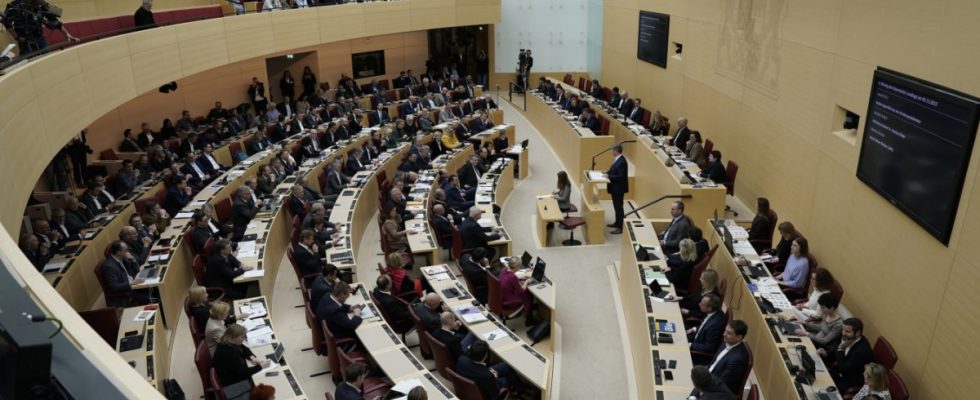The planned catalog of sanctions for members of the state parliament who are noticed in the state parliament with verbal abuse or disruption of meetings has been launched. On Thursday, the plenary session debated a corresponding change to the law on representatives in the first reading. The motion was submitted by the government factions CSU and Free Voters as well as the Greens and SPD. So from the entire parliament with the exception of the AfD. The latter is primarily the reason for this novella. Last year, State Parliament President Ilse Aigner (CSU) warned of the need for stricter measures in the event of violations of the dignity of the House. Now it comes to implementation.
In the electoral period from 2018 to 2023, when the AfD entered the state parliament for the first time, the presidium had to issue 26 reprimands; Before that, there hadn’t been a single one for more than two decades. Representatives of the Greens and SPD received three reprimands, the majority of the rest went to current or non-attached, former AfD politicians. “Our parliamentary democracy is defensive, it cannot be made fun of and it will not let anyone dance around on its face,” Aigner recently explained. There should therefore be a regulation “that certainly hurts and perhaps also deters”. The amended law is expected to be finally passed at the end of April.
The core is the abolition of classic reprimands. A three-tier system should take its place: First, calls to order are given in the plenary session. In particularly serious cases or repetition, fines of up to 2,000 euros can be imposed in a second stage, and persistent bullies can face fines of up to 4,000 euros. In the future, the last resort should be the exclusion of members of parliament, in extreme cases up to ten meetings; this should be done by majority decision of the plenary session. Not all of the last 26 complaints would have been eligible for a fine, explained Aigner, many of them would have stuck with a fine. The new rules also apply to violations of the house rules – for example, if guests invited by members of the Maximilianeum cross borders.
The parliamentary managers spoke at the debate. Michael Hofmann (CSU) sees the change as a “breaking point” in the post-war parliament. Over the decades, it has been enough for border crossings to be reprimanded. In the meantime, with a “faction with radical views and extremist minds,” one simply realizes that this is no longer enough. Examples according to Hofmann: the leaving of the hall of almost all AfD MPs at a commemoration of the victims of National Socialism and the words of Charlotte Knobloch or the appearance at the lectern of an AfD politician wearing a gas mask. For five years, the AfD has tried to “make this parliamentarism ridiculous” and did so “for the clumsy motive” of rejecting it “at heart.” Hofmann asked the AfD: “What should the next stage be – that you become violent?”
At least five AfD parliamentary group members are said to come from anti-constitutional groups
Jürgen Mistol (Greens) argued: “The AfD abuses and insults, it incites and it makes democratic institutions contemptuous – and in the AfD there is a method to all of this.” Simone Strohmayr (SPD) said that the AfD “really celebrates its reprimands, abuses the state parliament as a stage for its right-wing extremist agitation and is also proud of it.” She thanked Aigner for the initiative, on which the joint proposal of the four parliamentary groups “who respect this democracy” was based. Felix Locke (FW) complained that AfD MPs were “broadcasting the reprimands they received like trophies on social media”. In the political debate you don’t have to be a child of sadness, but you have to know “when the good ends.”
Some speakers mentioned research by Bayerischer Rundfunk, according to which at least five or possibly more AfD employees in the state parliament definitely come from anti-constitutional organizations, such as the “Identitarian Movement”. And that a rule is needed so that “enemies of democracy” are no longer paid for by taxpayers’ money. This would require a further change to the law on members of parliament. Felix Locke praised the fact that this was not being hastily inserted into the current reform. Aigner also recently emphasized that a careful, court-proof rule is needed.
Christoph Maier (AfD) called the reform of the complaints discussed on Thursday a “muzzle law of the cartel factions”. It is about “controlling the political discourse” and critics should be “silenced”. The concept of the dignity of the state parliament is so vague that it leads to “abusive application”. Maier also complained that his party was being excluded, for example in the election of a vice-president of the state parliament, where all AfD candidates have not yet found a majority. On Thursday, the AfD nominated Martin Böhm for the office. Counter-speakers justified their rejection, among other things, with Böhm’s threatening remarks at a party conference, according to which one had to “give the rabbits in the parliaments a well-deserved blow in the neck.”

